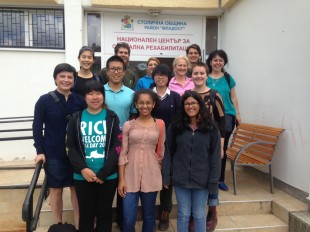Rice students travel overseas to help Bulgarian Food Bank with biannual food drive
This summer, a group of Rice University Owls spread their wings and traveled to Sofia, Bulgaria, to help the Bulgarian Food Bank with its biannual food drive May 19 through June 3.

This summer, a group of Rice University Owls spread their wings and traveled to Sofia, Bulgaria, to help the Bulgarian Food Bank with its biannual food drive. Photo credit: Global FoodBanking Network.
Nine Rice students participated in the trip, which was organized with the Global FoodBanking Network (GFN), an international nonprofit organization that fights world hunger by creating, supporting and strengthening food banks around the world in countries outside the United States, and Rice’s Center for Civic Leadership (CCL), which fosters engaged citizenship through integrated learning opportunities and creates mutually beneficial university-community partnerships that promote positive, sustainable change.
CCL representatives proposed a student-volunteer project when they met Anthony Kitchen, GFN’s manager of network programs, following a networking event at the H-E-B/GFN Food Bank Leadership Institute in Houston.
“The Center for Civic Leadership looks for opportunities to develop meaningful, long-term partnerships with community organizations,” said Lauren Caldarera, associate director of the CCL. “Our GFN partnership developed based on mutual interests in supporting students’ understanding of food inequality and raising awareness of the Bulgarian Food Bank’s food drive. However, this project only took root because of the investment of the student trip leaders who collaborated with GFN and the Bulgarian Food Bank to facilitate education, trip logistics and reflection for the student participants.”
“We saw this as an investment in the success of our member food banks and contacted select food banks in the network to gauge interest,” Kitchen said. “The Bulgarian Food Bank had the interest and the need, and the project became a reality.”
The students spent a semester learning about international service and the culture of volunteering. During the trip, they learned about hunger in Bulgaria and the Bulgarian Food Bank’s unique challenges due to a post-Soviet culture that is only beginning to embrace the concept of volunteerism.
The students organized the bank’s warehouse to make space for the food collected in the drive, staffed collection points at grocery stores and worked directly with beneficiaries who prepare and serve food at a soup kitchen and a day care center for disabled adults. In addition, the students exchanged experiences with Bulgarian students at the American College of Sofia, learned more about the country and its people on several cultural excursions and discussed their experience with the cultural attaché at the U.S. Embassy in Sofia.
“Our food drive is a huge undertaking, and we would not have been able to manage it without the student volunteers who donated so many working hours in a short period of time,” said Tsanka Milanova, executive director of the Bulgarian Food Bank. “They were motivated and professional and offered some great feedback. We applied many of their ideas, and it greatly improved our process of collecting food.”
Rice student and trip participant Amber Tong said, “Volunteering is not just an act – it can be an attitude.
“If I care about something, I should make it part of my life, and not just something I’d go out of my way to do,” she said.
Caldarera lauded the experience for exposing students to the culture, politics and history of Bulgaria and showing them how food disparities impact the lives of people locally and globally.
Angie Iyinbor, a Rice student who grew up in Bulgaria and participated in the trip, called it an extraordinary experience.
“Because the Bulgarian Food Bank staff consists of only five full-time employees, they heavily rely on volunteer help,” she said. “I felt our contribution in the warehouse was very appreciated.”
Iyinbor, who plans to become a doctor, said the experience introduced her to an issue that she knew little about. Living in Bulgaria as a child, she said, she witnessed hunger but was not aware that it was a widespread problem.
“From my studies, I have learned how important good nutrition is for health,” she said. “Therefore, this experience has helped me look at one of the sources of poor health among the underserved and has given me another perspective on medicine and public health. In fact, it has further fueled my passion to pursue medicine and help those who are in need.”
“This trip was really a collaborative effort with many parties vested in its success,” Kitchen said. “We hope to continue and deepen our relationship with Rice University and use this volunteer project as a model for future service trips.”


Leave a Reply